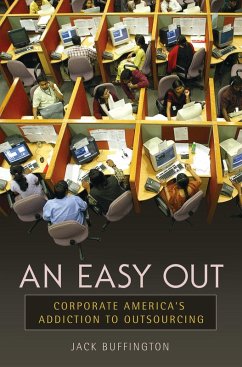Outsourcing is as controversial as ever in today's globalized world. But for all the noise about it in the media, whether reflecting the perspectives of labor, business, consultants, academics, employees, or protestors, there is far more emotion surrounding the benefits and drawbacks of the trend than there is common sense. Not only are these messages from different constituents polarizing, they are also confusing because they muddy the waters regarding corporate performance. Buffington clarifies the role of outsourcing in business today so that Americans can focus on something that really matters-real increases in productivity and competitiveness in a global economy. In most cases, he contends, neither outsourcing nor its close cousin, offshoring, are effective as a means to their intended end. Moreover, he points out, Americans focus a lot of negative energy on offshoring, not realizing that domestic outsourcing might be more harmful to our economy in the long run. Corporations lack awareness of this distinction, according to Buffington, and therefore they don't know which should be implemented in what circumstances. That ignorance is not only an obstacle for any company seeking to implement a successful outsourcing strategy, but it is also a dire threat to the long-term growth of the American economy. Buffington demonstrates that outsourcing often functions as an easy out for corporations that are reluctant to look instead at the root causes of their problems, whether low productivity, lack of innovation, or an unwillingness to invest in marketing, promotion, and sales. The reason that corporations aren't focusing on these core issues has a historical element as much as an evolutionary one within a global economy; the divisions today between workers and management are as sharp as they were back in the early 20th century, Buffington argues. But as much as we have to learn from the past about the impact of worker/management relations on worker productivity, we have even more to learn about all aspects of the productivity puzzle. Corporate productivity, or lack thereof, drives the success or failure of outsourcing or offshoring more than the act itself, according to Buffington. This book challenges business leaders to find their productivity and only then to make outsourcing decisions. This approach will work for corporations, consulting firms, outsourcers, and in the end, customers themselves. A more productive, worker-manager friendly business environment will lead to greater U.S. productivity, and therefore, more effective outsourcing/offshoring decisions.
Bitte wählen Sie Ihr Anliegen aus.
Rechnungen
Retourenschein anfordern
Bestellstatus
Storno









